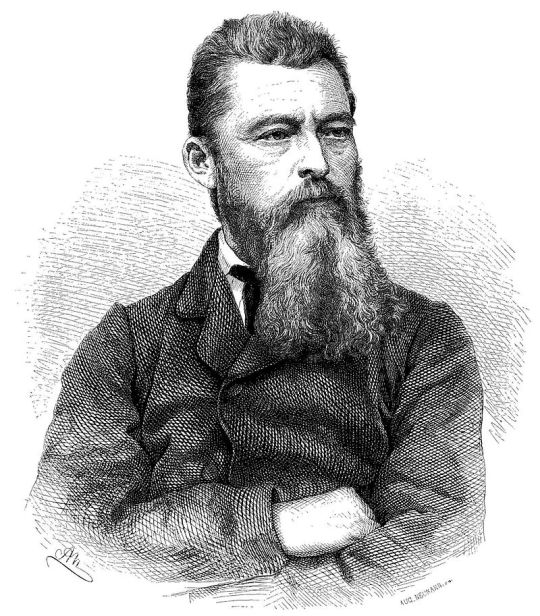#ludwig feuerbach
Text
"But certainly for the present age, which prefers the sign to the thing signified, the copy to the original, representation to reality, the appearance to the essence… illusion only is sacred, truth profane.
Nay, sacredness is held to be enhanced in proportion as truth decreases and illusion increases, so that the highest degree of illusion comes to be the highest degree of sacredness."
— Ludwig Feuerbach
57 notes
·
View notes
Text

"Wherever morality is based on theology, wherever the right is made dependent on divine authority, the most immoral, unjust, infamous things can be justified and established."
-- Ludwig Feuerbach
#Ludwig Feuerbach#morality#religious morality#religious horror#atrocity#religion#religion is a mental illness
65 notes
·
View notes
Text
Ein Dogma ist nichts anderes als ein ausdrückliches Verbot, zu denken.
A dogma is nothing more than an explicit prohibition to think.
Ludwig Feuerbach (1804 – 1872), German philosopher and anthropologist
49 notes
·
View notes
Text
madde, tinin bir ürünü değildir, ama tinin kendisi maddenin en üstün ürününden başka bir şey değildir.
engels - feuerbach ve klasik alman felsefesinin sonu
#kitap#edebiyat#blogger#felsefe#kitaplar#blog#kitap kurdu#friedrich nietzsche#karl marks#karl marx#friedrich engels#ludwig feuerbach#alman ideolojisi#das kapital#1844 felsefe elyazmaları#epikuros#felsefe blog#marxism leninism#vladimir lenin#georg wilhelm friedrich hegel#felsefi fragmanlar#carl sagan#carl jung#sigmund freud#jacques lacan#spinoza#baruch spinoza#materyalizm#diyalektik materyalizm#antik yunan felsefesi
3 notes
·
View notes
Text

La société du spectacle, G. Debord, 1967
#guy debord#la société du spectacle#society of the spectacle#ludwig feuerbach#the essence of Christianity#sociology#philosophy#society#modern society#modernity#capitalism#consumerism#reading#read in 2023#book quotes#mailmiocuoredipietratremaancora
2 notes
·
View notes
Text

Quanto più s’allarga la nostra conoscenza dei buoni libri, tanto più si restringe la cerchia degli uomini la cui compagnia ci è gradita.
~Ludwig Feuerbach~
8 notes
·
View notes
Photo

2 notes
·
View notes
Photo

“Even Atheists[sic] should teach their children about God,” can reliably be read as a call to promote belief, not think.
Notice that he didn’t say something like, “Even atheists should should promote rigorous critical thinking about the concept of God. The God concept should always be considered in the context of current understanding in science, especially cosmology, biology, earth history, and neuroscience. You’d also be amiss if you avoided the tools and findings of historical criticism as applied to the Bible. Encourage questions. Don’t shoo doubts into psychological corners where they become hidden biases and psychological distortions. You might even study confirmation bias extensively before you ever mention God. Etc.”
If he did then I’d have some reassurance that he intended for us to be in a joint enterprise of inquiry, and maybe along the way we’d end up modifying our views or at least coming up with table clearing understandings.
But, I doubt this is Prager’s intended objective. Like many on the right, he looks with great concern at the demographic apostasy away from heteronormativity, away from capitalism, and away from faith and the old gods.
I doubt Prager would want anything like the following taught.
God never appears as an object subject to objective examination. So, where do truth claims about this god come from? This is obviously an historical question (gods have beginnings, and ends) but also a psychological one.
Here’s Ludwig Feuerbach from his The Essence of Christianity (1841):
"As God is nothing else than the nature of man purified from that which to the human individual appears...a limitation or an evil..."[1]
"The Christians certainly gave their God no attributes which contradicted their own moral ideas, but they gave him without hesitation, and of necessity, the emotions of love, of compassion. And the love which the religious mind places in God is not an illusory, imaginary love, but a real, true love. God is loved and loves again; the divine love is only human love made objective, affirming itself. In God love is absorbed in itself as its own ultimate truth."[2]
"Whatever strongly impresses a man, whatever produces an unusual effect on his mind, if it be only a peculiar, inexplicable sound or note, he personifies as a divine being. Religion encompasses all the objects of the world; think of anything existing, and you will find that it has been the object of religious veneration. Nothing is to be found in the essence and consciousness of religion that is not there in the being of man, that is not there in his consciousness of himself and the world. Religion has no particular content of its own. Even the emotions of fear and dread had their temples in Rome. The Christians, too, hypostatized their mental states into beings and qualities of things, their dominant emotions into powers dominating the world. In short, they hypostatized the qualities of their being — whether known or unknown to them — into self-subsisting beings. Devils, goblins, witches, ghosts, angels, etc., continued to be sacred truths as long as the religious disposition held its uninterrupted sway over mankind."[3]
If God is an objective existence, real, ‘out there’, apprehensible in some way by us, then why do localized norms of this concept continue to persist? I.e., why is God one thing here and another over there? What explains the great divergent and contradictory variations in God’s definition, its intentions, its history of interaction with the cosmos and with us, and how we move its conceptual parts about? It seems to mean anything we want it to. There’s no evidence of it animating the world, only us animating it.
God is a repository for hope, despair and wonder, but this should immediately set off alarm bells since our strongest desires and weaknesses are known to blind us. The unresolved wounds, the heart wandering in a barren field of loneliness, the tired soul and exhausted body, the dark night craving any light, the injustice facing a cold world - our sufferings prime us for desiring ultimate relief. Our deepest needs often echo into nothing but we want there to always be a response. The “God shaped hole” is nothing more than a label for the need and its imagined relief.
(A society more advanced, humanistic, ethical and intelligent than the one we have now would see the wounds much more clearly, hold them in compassion, and go as far within our natural limits as we could to assuage them.)
Why hasn’t there been a convergence of understanding as to what this god is as there has been for electromagnetic radiation, cells, the constant c (speed of light), or the amygdala? If this god were capable of being investigated directly, it’s possible that all theological disputes would quickly evaporate. The so-called ‘hiddenness of God’ is the tacit and barely utterable realization that there’s nothing there from which anyone can derive reliable knowledge. We follow the bread crumbs though the forest but then they stop.
That God is ineluctably what we say it is - with we being intractably theologically plural and suspiciously promiscuously unconstrained by any identifiable objective reference point - should be a cue for us to look not for God’s fingerprints but our own.
Whether or not you find any of the above persuasive, it remains a fact that God is an inescapably unstable notion (descriptively and existentially) and, an admittedly stronger claim - teeters on unreality, despite the strength of belief telling us otherwise.
The above are arguable truths about God. But the Dennis Pragers of the world and most of God’s partisans don’t want there to be any argument about this. The all-powerful needs human bodyguards and I suspect Prager is one of them.
A test: Would Prager support a philosophy of religion requirement in the public schools? I suspect not, nor would many parents support it once they realized that God’s existence would be treated as an open question and not merely assumed. I’ll bet any money that given the abstract choice between children retaining their familial God belief or possibly abandoning it but with the outcome being a higher level of philosophical literacy, most parents would prefer the former. God belief works best when sticky and reflexive, not held at arm’s length for interrogation.
Let’s teach kids about God.
But, would children be taught about how God is often seen slouching around atrocity? Saving Christian civilization apparently justified Pinochet’s goons tossing living torture victims out of helicopters. What about Iran, the Islamic God state that uses gang rape, sexual torture and murder to punish imagined offenses against Allah? God had his hand on the knife that tried to kill Salmon Rushdie. Journalist, poet and fiction writer Tahar Djaout was assassinated by God’s sons in Algeria in 1993 for his support of secularism. Palestinians are killed with impunity by the state that steals land because God told them it’s okay. God sides with every army, including the terrorist state of Russia. God was a co-pilot on American B-52s over Vietnam. God restricts the vote of African Americans, but also enfranchises it.
If all kids were taught about the gods with an emphasize on critical thinking, I would hope that they would then also be taught that on the other side of demystification and obscurantism, down the roads of rationalization and naturalization, there’s the possibility of a new enchantment, an ecstatic humanism.
Its vital forces are the aliveness in learning, the delight in discovery, the motivating pull of a mind and life devoted to questions and possibilities, the rich treasure of emotional life resonant with nature and others, and the satisfactions of self-expression. This enchantment opens the window wide to the radically new, it’s prepared for the overthrow of assumptions, it brings the craziness of general relativity into its own bilateral self/universe concept, it wonders at its lucky emergence from deep evolutionary and cosmological time, it awes, it dreads at sublimity, it imagines cosmic horror, it muddies its certainties and also seeks knowledge, it carefully attends the conversion of experience into meaning, it breaks free of itself as a value and also comes home to itself, it stitches wholes together and breaks them down.
Don’t we in our dull habits ever get bored as God’s sculptors?
Having said all that, don’t let me suck the air out of the room. Beyond it all I believe that we’re all still stargazers on the same ship of fools.
[1] p. 181 in Feuerbach, L. (1957). The Essence of Christianity. Translated by George Eliot. Harper & Row Publishers, Inc. New York: NY.
[2] Ibid. pp. 55-56
[3] Ibid. p. 22
4 notes
·
View notes
Text

«El ser divino es la esencia humana transfigurada mediante la muerte de la abstracción; es el espíritu separado del hombre. En la religión se libera el hombre de los límites de la vida; aquí abandona lo que le oprime, paraliza y afecta en forma repugnante; Dios es el sentimiento de sí mismo del hombre liberado de toda repugnancia; libre, dichoso y feliz se siente el hombre únicamente en su religión, solamente aquí vive a su manera y celebra su domingo».
Ludwig Feuerbach: La esencia del cristianismo. Editorial Trotta, págs. 145-146. Madrid, 1995.
TGO
@bocadosdefilosofia
@dies-irae-1
#esencia#esencia humana#dios#ser divino#religión#la esencia del cristianismo#feuerbach#ludwig feuerbach#humanismo#humanismo ateo#ateísmo#ateísmo antropológico#crítica a la religión#alienación#enajenación#teo gómez otero#materialismo
4 notes
·
View notes
Text
"Religion has poverty as its father and imagination as its mother." by Ludwig Feuerbach
6 notes
·
View notes
Text






























fans + art
#artist is i think l gerard#this post is going be kinda hard to find some of the paintings and artist because they are cut off but im trying my best#artist i cannot find#i love another by abraham solomon#adele meyer mrs carl meyer by john singer sargent#cant find this artist#cant find artist nor painting#artist is franz von persoglia#i think this is anselm feuerbach#princess elena pavolovna belosselsky-belozersky by christina robertson#cant find artist or painting name#portrait of madame fanny leontine gronkowska by barbara mackay#artist is frederick warren freer#princess mathilde bonaparte by edouard-louis dubufe#the japanese fan by elizabeth reynolds finley#the painting is called blue dress but i cant find the artist#leaving the ball opera by pedro pierre ribera#elegant lady with a fan by ludwig knaus#idle thoughts by auguste toulmouche#can't find artist or painting#marie madeleine mazade by maurice quentin de la tour#cant find anything on this one#portrait of mrs. francis stanton blake by julius le blanc stewart#artist is jean francois portaels#artist is august schoefft#mary frances mackenzie by frank dicksee#artist is jan adam kruseman#can't find anything on this#artist is sir william blake richmond#artist is jean de la hoese
217 notes
·
View notes
Text
Günün sözü!
“Ahlakın sadece dine bağlı olduğu ve adaletin ulu bir yetkiye bağımlı hale getirildiği yerde, en ahlaksız, en adaletsiz, en kepaze şeyler, meşrulaştırılabilir ve yerleştirilebilir.”
Ludwig FEUERBACH
Anlayana saz.!

21 notes
·
View notes
Text
45 notes
·
View notes
Text
“History is as little able as cognition to reach a final conclusion in a perfect, ideal condition of humanity; a perfect society, a perfect "state," are things which can only exist in the imagination. On the contrary, every successive historical situation is only a transitory stage in the endless course of development of society from the lower to the higher. Each stage is necessary and therefore justified for the time and conditions to which it owes its origin. But it becomes decrepit and unjustified in the face of new, higher conditions which gradually develop in its own womb. It must give way to a higher stage which in its turn will also decay and perish.”
― Friedrich Engels, Ludwig Feuerbach And the Outcome of Classical German Philosophy
11 notes
·
View notes
Text

Quanto più s’allarga la nostra conoscenza dei buoni libri, tanto più si restringe il cerchio degli uomini la cui compagnia è gradita.
.🦋.
Ludwig Feuerbach
80 notes
·
View notes
Text
One of the interesting ideas from Ludwig Feuerbach was him talking about how (mainstream) Protestantism has less emphasis on Trinitarian theology than Catholicism even though it’s more or less the same theology and Feuerbach attributes it to how if you cut the bullshit Mary is effectively a goddess in Catholicism and the Trinity is basically a divine family and when Protestantism explicitly demoted Mary’s status that resulted in an implicit demotion of the Trinity
Anyway I think that’s funny in the context of Mormonism which has a figure of the “Holy Mother” who is the wife of the Father and there is much more explicit familialism in their version of the Trinity
26 notes
·
View notes